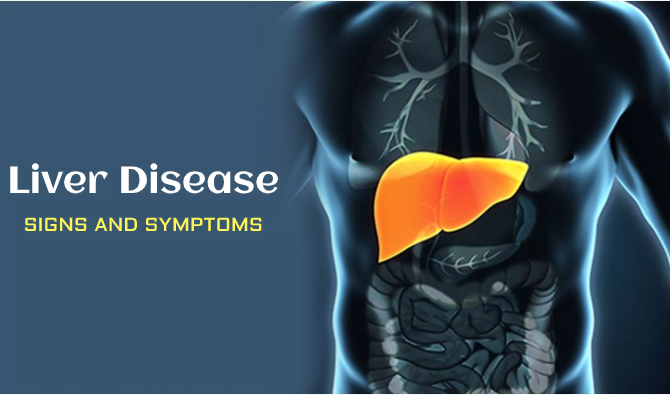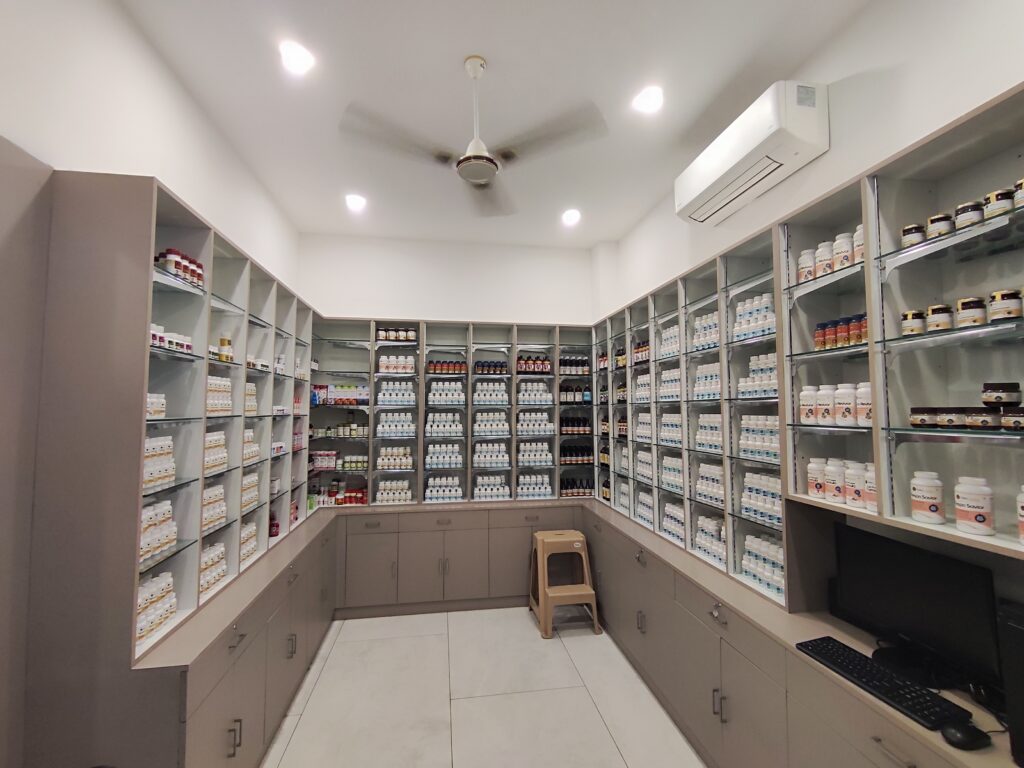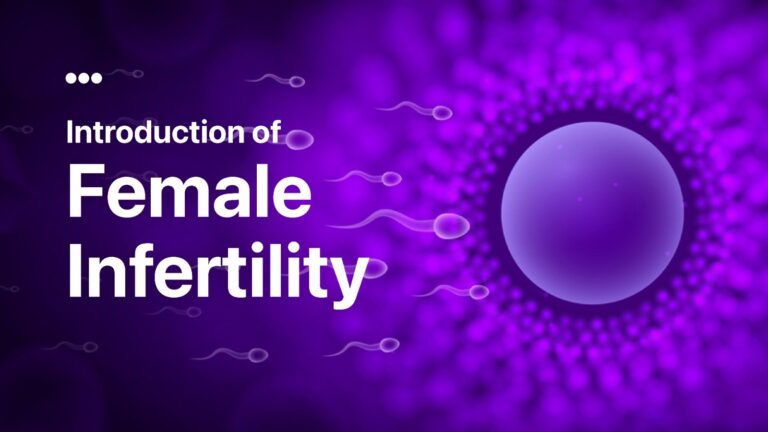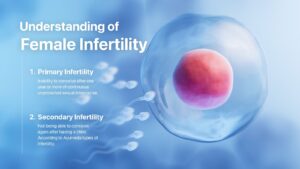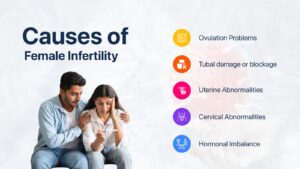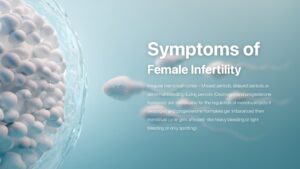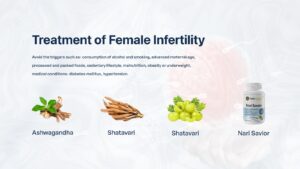INTRODUCTION OF FEMALE INFERTILITY
A woman’s inability to conceive after one year or more of continuous sexual intercourse is called female infertility. In case of infertility, even if birth control is not used, the woman is not able to conceive. Infertility is a very complicated topic for the society, infertility not only causes mental stress and depression but there is stress at the family level also. This social and family pressure increases mental stress further and as this mental stress increases, the chances of infertility increase even more. Polycystic ovarian syndrome (PCOS) and polycystic ovarian disease (PCOD), problem in ovulation (most common problem), premature ovarian failure, endometriosis, uterine fibroids and polyps, genetic factors, nutrition deficiency, environmental pollution, mental stress or depression, increasing age are the main causes of infertility.
In Ayurveda infertility correlated with bandhyatva. In Ayurveda its treatment is first done through – removal of cause, maintain the healthy diet, detoxification and cleansing (samshodhana), mitigation treatment (samshamana), medicated enema. With this treatment the doshas (vata, pitta, kapha) causing infertility are managed and nutrition is also provided which helps in managing infertility.
UNDERSTANDING OF FEMALE INFERTILITY
In today’s modern era, woman are self dependent and do jobs due to which there is stress of work and delay in marriage due to which pregnancy also gets delayed. All these reasons increase the infertility rate.
2 types of infertility –
-Primary infertility- Inability to conceive after one year or more of continuous unprotected sexual intercourse.
– secondary infertility – Not being able to conceive again after having a child.
According to Ayurveda types of infertility.
-Kakavandhya- Not being able to conceive again after having one child.
-Anapatya – (No child)- Not having a single child.
-Garbhasravi- (repeated abortion)-3 or more consecutive spontaneous abortions.
-Mritavatsa- (repeated stillbirth)- stillbirth in more than one pregnancy.
-Balakshaya- lass of strength.
-Bandhya (infertile woman) – infertility caused by injury to the uterus during child hood.
CAUSES OF FEMALE INFERTILITY
-Ovulation problems – Ovulation related disorders occur, like – (premature ovarian failure, polycystic ovarian syndrome (PCOS), polycystic ovarian disease (PCOD).
These are the most common causes of infertility.
-Tubal damage or blockage– tubal blockage is caused by – infection, endometriosis, surgery in the pelvic region.
-Uterine abnormalities– uterine fibroids, polyps, septate uterus, unicornuate uterus, bicornuate uterus, didelphys uterus.
-Cervical abnormalities- fibroids, polyps, incompetency of cervix.
-Hormonal imbalance – (Thyroid disorders, hyperprolactinemia) and due to hormonal changes including- menopause.
-Infection and injury in endometrium due to dilatation and curettage.
-Advanced maternal age – fertility declines slowly after the age of 30, and reproductive parity declines rapidly after the age of 35.
-Weight- due to excessive – weight gain (obesity) or due to lass of weight (underweight).
-Mental stress or depression – Infertility rate in woman under stress becomes twice as compared to woman who remain stress free.
-Genetic factors.
-Medical condition – diabetes mellitus, high blood pressure, autoimmune disease.
According to Ayurveda – Imbalance diet (abnormal food habits), impure food, imbalance lifestyle, excessive dryness and weakness (by having sexual intercourse with a woman who has many dryness and weakness in her body).
– By having too much sexual intercourse (excessive coitus).
– By having sexual intercourse with a younger woman (Bala).
– Abnormalities in ovum
– Idiopathic factors.
The aggravated vata dosha along with pitta dosha causes Artava kshaya, this leads to anovulation and causes infertility.
SYMPTOMS OF FEMALE INFERTILITY
Irregular menstrual cycles – Missed periods, delayed periods or abnormal bleeding during periods (Oestrogen and progesterone hormones are responsible for the regulation of menstrual cycle if oestrogen and progesterone hormones get imbalanced then menstrual cycle gets affected -like heavy bleeding or light bleeding or only spotting).
-Difficulty getting pregnant- Facing many problems in pregnancy like – not getting pregnant even after many years of marriage and even if one conceives, having a miscarriage.
-Miscarriages – Having recurrent miscarriages.
-Pelvic pain- sever pelvic pain due to endometriosis specially during periods, pain during sexual intercourse (dyspareunia) and after intercourse, pain during urination (dysuria), pelvic pain due to PID (Pelvic inflammatory disease).
-Heavy or light menstrual bleeding and bleeding with pain (dysmenorrhea-menstrual cramps) due to inflammation in pelvis.
-PID (Pelvic inflammatory disease) can from abscess in the reproductive tract, which may be a cause of infertility, pain in lower abdomen, white discharge (unusual or heavy discharge) with unpleasant odour, discomfort, wetness.
-PCOS (polycystic ovarian syndrome) or PCOD (polycystic ovarian disease) – Too many pimples or acne on the face and having hair on the face due to hormonal imbalance, having a lot of pain during periods.
Social isolation- Woman feel very ashamed due to not having a child, they consider themselves isolated from society. Not having a child also affects their married life.
-Women remain very sad and their stress level increases.
PREVENTION OF FEMALE INFERTILITY
By following some points you can prevent female infertility or reduce the risk of getting female infertility-
Diet- follow a balanced diet (which include- fresh fruits (unpeeled apples, bananas, oranges, strawberries, guava, mangos etc.), fresh vegetables (tomatoes, onions, corn, carrots, broccoli, beans, peas etc.) Also include nuts and seeds (walnuts, almonds, peanuts, sunflower seeds and pumpkin seeds) and fiber rich foods like – oats.
-Maintain healthy lifestyle, daily exercise – for 30 to 40 minutes.
– Avoid trans fats (found in processed food and packaged food).
-Avoid the stress- stress management with meditation, pranayama, yoga, get enough sleep (7 to 8 hours per night) and reading and listening music and family support are very effective in reducing stress and providing emotional support and strength.
-Consume antioxidant rich foods like- berries, leafy greens, seasonal fruits and vegetables to protect your cells from oxidative stress.
-Avoid the consumption of excessive alcohol and smoking – because alcohol and smoking have a bad effect on the quantity and quality of ovum and also affect the menstrual cycle. If alcohol and smoking are consumed during pregnancy, it harms the mother as well as the fetal health.
-Management of chronic disorders like- diabetes mellitus, thyroid disorders.
-Vaccination should be done against rubella and HPV (Human papillomavirus) and screening should be done for STIs.
–Avoid risk factors- Advanced maternal age- As age increase, fertility decreases, hence one should conceive on time (one should conceive before crossing the age of 30 years).
-Family history – If someone in the family has had early menopause or infertility then one should be careful about it.
-Avoid environmental toxins- Chemicals (like pesticides and lead).
-If you have problems like- pelvic pain, irregular periods, painful periods then you should immediately consult your health care professional.
In Ayurveda female infertility correlated with bandhya. Infertility cause due to imbalance of doshas, by following these preventive measures, doshas in the body remain balanced and by maintaining doshas balance and proper digestion of food infertility can be avoided.
DIAGNOSIS OF FEMALE INFERTILITY
History – Medical history- Surgical (dilatation and curettage or pelvic surgeries) and reproductive history.
Family history -Someone in the family has had early menopause and infertility.
Physical examination – General and pelvic examination.
Examination of doshas and prakruti.
Diagnostic tests – Ovulation testing – Follicular examination by USG (ultrasound) or TVS (transvaginal ultrasound).
Blood tests- Hormonal test- Follicle stimulating hormone (FSH)
-Luteinizing hormone (LH)
-oestrogen, Progesterone
-Anti-mullerian hormone level (AMH).
Imaging tests- Ultrasound, Hysterosalpingogram (HSG) or Hysteroscopy.
Laparoscopy- To visualize the reproductive organs.
TREATMENT OF FEMALE INFERTILITY
Firstly manage stress and follow a balance diet and healthy life style.
-Avoid the triggers such as- consumption of alcohol and smoking, advanced maternal age, processed and packed foods, sedentary lifestyle, malnutrition, obesity or underweight, medical conditions- diabetes mellitus, hypertension.
According to Ayurveda- Detoxification (panchkarma) should be done to remove the toxins (three doshas- vata, pitta, kapha). Once the body is purified through detoxification, treatment to mitigate the doshas should be undertaken.
MEDICINES- Ashwagandha, Shatavari, Amlaki- these herbs help in balancing hormones.
-Chyavanprash
– Ashokarishta, Dasmoolarista
-Kanchnaar guggul
-Latakaranj
-punarnava guggul
– Nari savior
Helpful in ovulatory disorder and correct PCOS.
CONCLUSION
Infertility is an inability to conceive after one year of regular coitus. Characterised by PCOS, PID, Pelvic pain, Repeated miscarriages. Healthy life style and healthy diet can manage the complications. Avoid the trigger can prevent the infertility, if any such symptoms are found in your body then definitely contact your health care professional.



